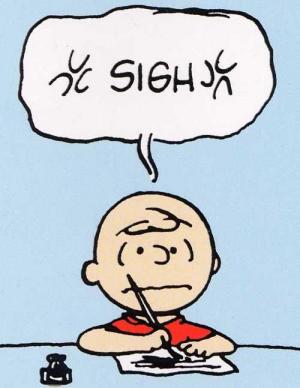Those of you keeping track of my recent exploits know that I've been taking part in the FirstPerson Arts StorySlams here in Philadelphia (home to sport- and food-related heart troubles). My prior 2 experiences in front of the mic have been described here and here. I consider these two performances successes.
On April 9th, 2012, I bombed.
 |
| Sigh indeed, CB. |
As a writer I've experienced various types of rejection, but failure is something I consider philosophically, emotionally, and psychologically distinct from rejection.
While being rejected can feel like failure, it is only a failure in one way: failure to connect to a particular reader or set of readers. When The New Yorker rejects my stories, it's just a failure to tell their kind of story. No journal disputes the idea that they have particular tastes, though vague descriptions of "we just want good stories" can make a writer feel like a journal will literally publish anything when, in reality, they will only publish the stories that appeal to their tastes.
And sure, some stories are failures. But they are not failures when they are rejected. They fail first. But they fail on the page and can be reworked.
Now, as a writer, my performance is controlled and often isolated. The stories and novels I construct come together over many hours of thinking*, writing, revising, and more thinking. Much of that is done alone. Or, in my mind, which is essentially the same thing.
As an adjunct, my performances in front of the classroom can involve failure -- failure to make points clear, failure to answer student questions, etc. -- but I can, at any moment, correct those mistakes. Even if I feel like I wasn't "at my best" I don't feel like I've failed since the next class meeting can correct and adjust prior class's shortcomings. Maybe it's an unfair distinction: but the failure in the classroom feels temporary when it happens.**
So, here we are. Or, there I was, the final storyteller at the StorySlam on Monday evening. World Cafe in Philly. Full house.
I'd spent about an hour and a half practicing my story in the car and knew I'd have to be careful. The topic -- Identity Crisis -- had befuddled me for weeks. Finally, I'd decided to tell a story about how I don't drink. Except -- as is obvious by that prior sentence -- there is no story to "how I don't drink." It's an essay at best.
Worse, by the time I got picked, my planned outline had evaporated in a haze of caffeine and distraction caused by 9 other stories. As I walked up to the microphone, my mind blanked. I opened with a line I hadn't practiced:
"So. I'm an asshole."
My idea for framing my story/essay -- stumbled upon during the evening -- was to paint myself as an asshole about alcohol. This would help me tie together a bunch of random experiences to create the illusion of a story where I develop from a teenager to an adult -- shedding my negative attitude towards alcohol even though I never end up drinking. The ultimate conclusion would be that I lived my life based on a decision made by my 9th grade self, which is a pretty dumb thing to do. It makes sense in summary form.
However, because I'd practiced the story a particular way, I didn't know what to do with this new opening line. I jumped around, skipping past any narrative elements. I made a joke regarding Straight Edge music which would have been fine except another storyteller had a similar thread in her performance. I blanked on the narrative details about my time in college when I was friends with a very religious guy that found Biblical justification for wine coolers; I forgot to mention another guy that was a recovering addict but resented the fact that I'd never had a drink whereas he constantly fought the urge for the party life he'd had to leave behind.
I left out the story. In a storytelling event.
By the end, I managed to remember my conclusion, but I'd already failed. The audience had nothing to follow. My delivery suffered
In the end, I got the lowest score of the night. And I'm okay with that, though it sure helps to fail after previously succeeding.
*In the coffeeshop I consider a home, I've spent lots of time staring out the front window at the Martin's Cleaners across the street; I've also made people in my line of sight uncomfortable.
**My focus here is performance failure, not failure to educate.
No comments:
Post a Comment